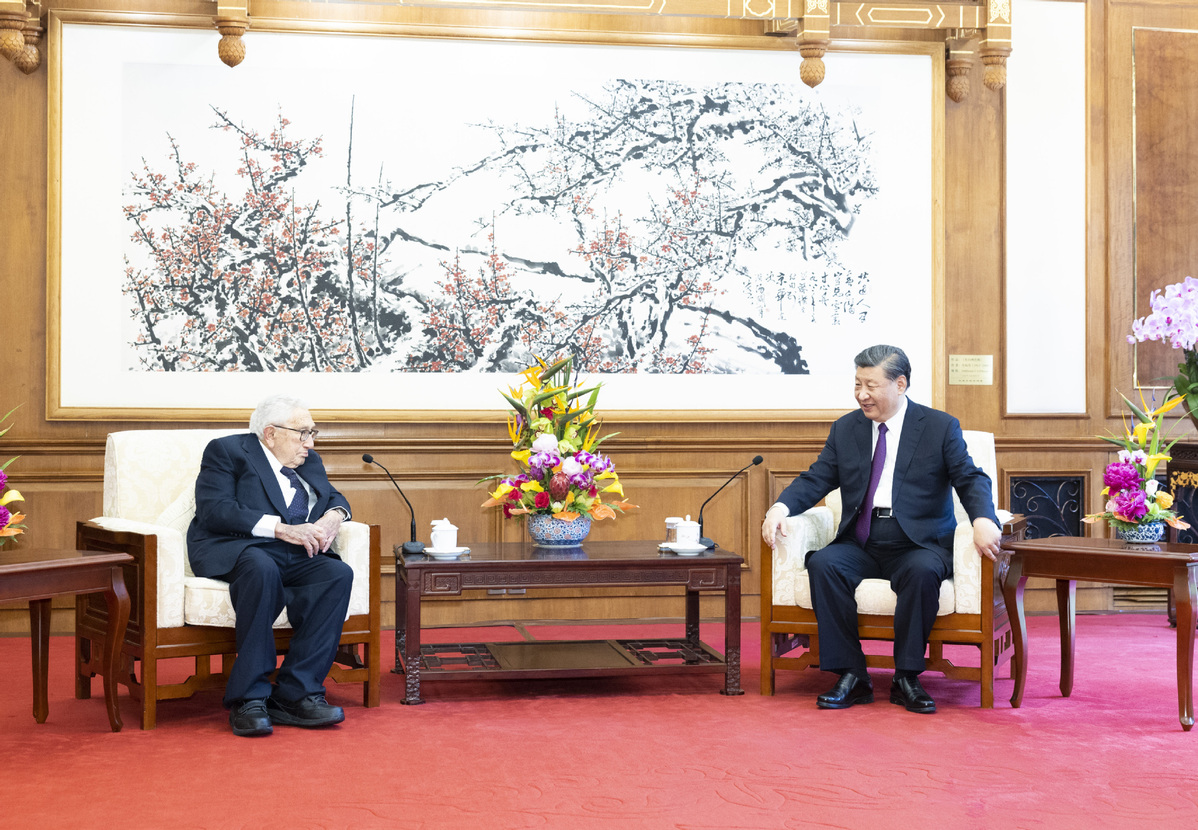Kissinger's visit highlights need for more pragmatism


Amid the diplomatic encounters and high-level dialogues between China and the United States, a moment for reflection has emerged regarding a global way forward, reminiscent of a historic juncture that shaped the course of international relations.
President Xi Jinping, in his meeting on Thursday with former US secretary of state Henry Kissinger, harkened back to a pivotal decision made more than five decades ago by Chairman Mao Zedong, Premier Zhou Enlai, then US president Richard Nixon and Kissinger. This decision to normalize China-US ties was not only courageous but also transformative, reshaping the world order in unforeseen ways.
This historic resolve, initiated at the same Villa No 5 of Diaoyutai State Guesthouse in Beijing where Xi and Kissinger met on Thursday, marked the beginning of a normalization process that would shape the course of bilateral relations.
President Xi warmly acknowledged the 100-year-old former diplomat's role as a longtime, cherished friend of the Chinese people, lauding his historic contributions in fostering the growth of China-US ties and nurturing the bond of friendship between their peoples. Over the years, Kissinger has been instrumental in fostering meaningful and reciprocal interactions between the two nations.
"The Chinese people value friendship, and they never forget their old friend, nor your historic contributions to promoting the growth of China-US relations and enhancing friendship between the two peoples," Xi said during the meeting, citing Kissinger's more than 100 visits to China.
Although it seems sad that the world's largest economy needs a centenarian sitting on a prominent stage to relieve tension, Kissinger carried out his mission and has encouraged the administration of US President Joe Biden to avoid a confrontational stance toward Beijing.
Kissinger also met with Defense Minister Li Shangfu, who is still sanctioned by the US, and senior diplomat Wang Yi, director of the Office of the Foreign Affairs Commission of the Communist Party of China Central Committee. Kissinger's informal visit also coincided with an official delegation led by John Kerry, Biden's top climate envoy, to Beijing.
Kissinger has consistently emphasized the imperative of effectively managing the potential risks of a conflict between China and the US through dialogue and communication. Last month, in an interview with The Economist, Kissinger revealed his alarm at the escalating technological and economic rivalry between China and the US. "We're in the classic pre-World War I situation where neither side has much margin of political concession and in which any disturbance of the equilibrium can lead to catastrophic consequences," he said.
Similarly, in another media interview, Kissinger said that to prevent conflict with China, "the US needs to refrain from being heedlessly adversarial and pursue dialogue instead". Recognizing the gravity of the situation, he has shown an aversion to the intensifying competition between the two nations and stressed the need for careful consideration and strategic foresight.
Kissinger's apprehension underscores the significance of managing this delicate dynamic to ensure stability and cooperation in the global arena. His diplomatic approach is rooted in a pragmatic realism, eschewing ideological biases and placing a premium on equilibrium, which seems in dire need in US politics toward China and Russia.
With a keen awareness of history's lessons, Kissinger champions a path that prioritizes peaceful resolutions and mutual understanding. Unfortunately, the personal trip by Kissinger, which was preceded by official visits by Secretary of State Antony Blinken and Treasury Secretary Janet Yellen, is being viewed with a different lens in Washington.
Although the recent high-profile visits reflect a mutual desire for contacts and communication between China and the US, mere communication alone cannot repair the rift, amid the fragility of current Sino-US relations. The Biden administration's pivot from "decoupling" to "de-risking" is an encouraging shift, yet certain actions, such as the reported plans for further restrictions on US investments in China, raise concerns.
The Biden administration now stands at a critical crossroads and would do well if it could draw inspiration from Kissinger's approach to diplomacy. Additionally, Washington's continuous pressure on China's core interests, like the Taiwan question, remains a sticking point. To revitalize the bilateral relationship, substantial and sustained efforts are needed from both sides.
The US must move beyond the illusion that it can exert strategic and economic pressure on China while expecting cooperation on its own terms. Mutual trust must be built upon concrete actions, translating goodwill into tangible deeds.
Xi's call to Kissinger for both countries to make profound choices speaks to the pivotal nature of this moment. The decisions made by China and the US will ripple beyond their borders, having an impact on the global landscape. The world watches with keen interest, hoping that both countries will navigate this crucial phase wisely to find a renewed push for cooperation and understanding.
The author is an international affairs commentator and freelancer based in Karachi, Pakistan.
































